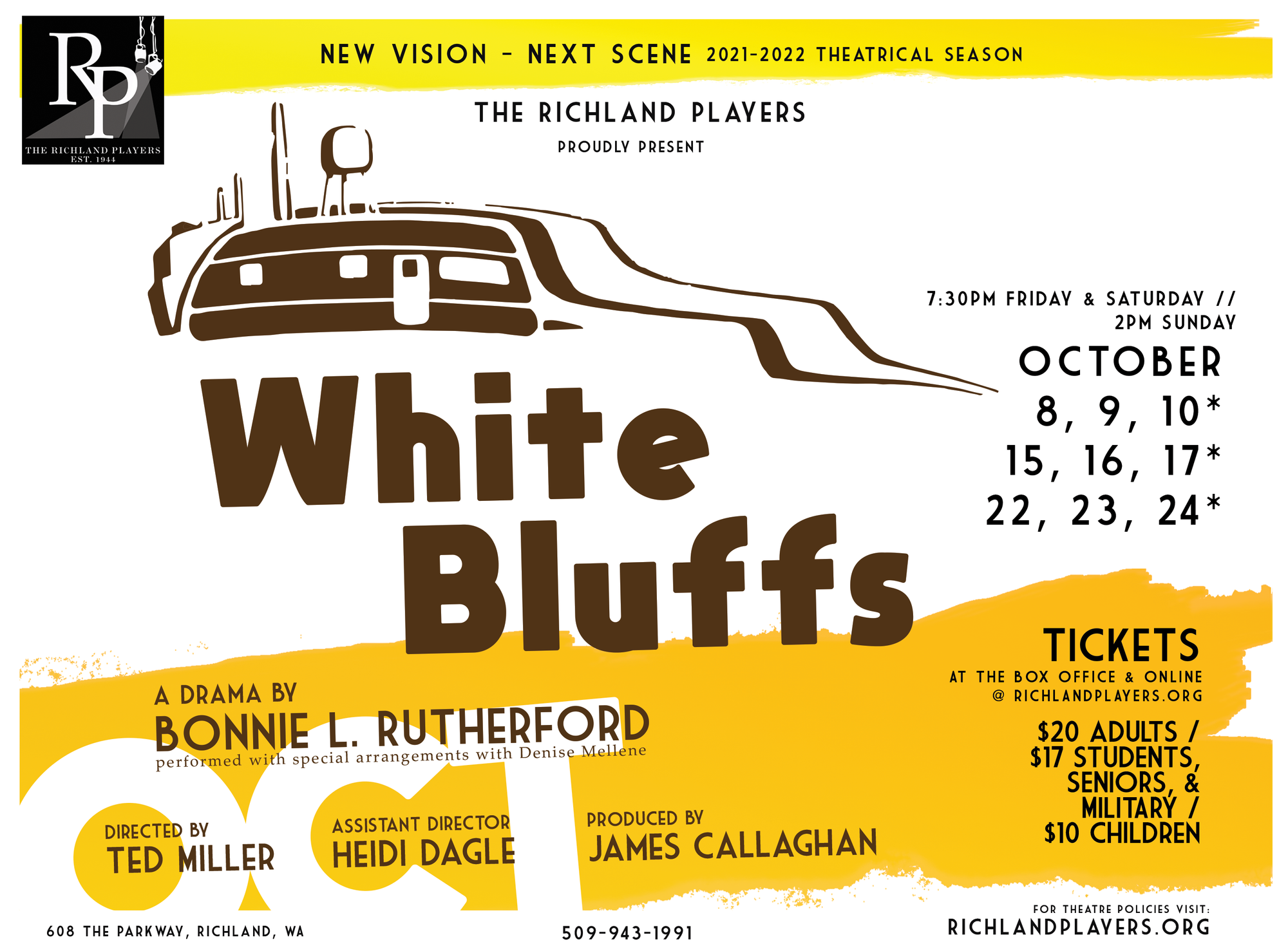The Richland Players opens their first live production in almost two years with White Bluffs, a locally written play first produced in 2000. As the director, I asked my assistant director Heidi Dagle and dramaturg Adrienne Fletcher to discuss the play with me.
Ted: Thank you so much for being a part of this amazing team and talking to me about White Bluffs. Heidi, tell our readers a little about the story.
Heidi: This play takes place in 1944, and follows Kim and Danny, a young newlywed couple trying to make their way. Danny just started a new job at the Hanford Site, but everything is very hush-hush; even he doesn’t know what he is working on. Kim has something from her past that Danny doesn't know. They live in the Hanford trailer camp next to Willy and Gladys, an older couple that Danny has known all his life. Together the four of them discover things about each other, and themselves, that could break them apart. This is an eye-opening, tug-at-the-heartstrings story.
Ted: How did you get involved in this production?
Heidi: I actually auditioned for the show last season, before the pandemic. I was too old for Kim and too young for Gladys, but Diane Hudson, who was the director at that time, wanted me to be on the team and asked me to be her assistant director! When the pandemic required us to postpone the show, and you took over as director, you very kindly kept me on as your assistant director. I thank you for that!
Ted: Yes, it was truly an honor to step in as director and continue the work Diane started. None of us knew it would be this long before we could perform this play. Bonnie Rutherford, the playwright, was a dear friend, so I have a special connection to the play. And I actually played Willy when we took White Bluffs to the Kaleidoscope State Theatre Festival in 2001.
Heidi: Thanks, Ted. I am truly enjoying watching and learning from you. You have a very relaxed and efficient directing style. I appreciate the fact that everyone in the cast and on the production team are so included in everything. The collaboration is wonderful.
Ted: Such a great story, written by a local playwright and set right here at Hanford. In 1944, very few of the 50,000 Hanford workers knew what they were building. Secrecy was paramount. Husbands and wives couldn’t even tell each other what they were doing. But the weapon they were developing was used against Japanese civilians and forever changed the course of human history. The themes the play explores are just as relevant today. Adrienne, as our dramaturg, what are some of your thoughts about the history and the message that this story has for our audience?
Adrienne: The historical events surrounding this story are not only an integral part of the history of this area, but infinitely woven into my own family history. My grandmother was born in Hawaii. She was 11 years old when the Japanese bombed Pearl Harbor. The next day her father was taken into custody under the suspicion that he was somehow involved, which he was not. In the months following, my grandmother, her mother, and her siblings were also taken into custody and transferred to camps in North Carolina, and then eventually in Crystal City, Texas. Shortly after that, they were repatriated to Japan and traded for American POWs. My grandmother spent the rest of her childhood and teenage years in Japan. She was attending a boarding school outside of Nagasaki and saw the mushroom cloud as the bomb destroyed the city and its people.
It has been interesting to work on this story as someone whose family lived on the ‘other side’ of these historical events. My grandmother is still alive. We still remember these events, but too easily we forget the mistakes we made along the way in the name of national security. This story strikes up that conversation, and it’s been enlightening to continue it as a granddaughter of a Japanese American.
The discussions I have brought to the cast and crew about how to approach this story from an anti-racist perspective have been humbly received and fruitful.
Ted: Thank you for being such an important part of this process. One of the challenges of telling stories like this one is to be truthful to the history and not to oversimplify or whitewash the historical events. White Bluffs explores themes of patriotism, grief, racism, and what it means to be American. As a country, those issues still impact our ability to come together for all our citizens.
Let me ask each of you to tell our readers why they should see White Bluffs.
Heidi: People should see White Bluffs not only to support local community theater, but also to honor a local playwright. And they will probably learn some history that they didn't know.
Adrienne: I encourage people to come see the play because I hope it will inspire them to reframe their thinking around these historical events. I hope that the audience is led to continue the conversation this story begins. And yes, please come support the safe and much needed return to live theatre!
Ted: Thank you both for being part of this team.
White Bluffs runs October 8, 9, 15, 16, 22, 23 @ 7:30pm, 10, 17, 24 @ 2pm at the Richland Players theatre. Tickets available at RichlandPlayers.org.


